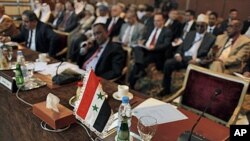Arab League members are considering the alliance's next steps toward Syria, including the possibility of a forming a joint peacekeeping force with the United Nations.
Arab League ministers met throughout the day Sunday, regrouping after a league plan was vetoed by Russia and China at the U.N. Security Council. A draft resolution being circulated proposes a joint peacekeeping force to help end the violence that has rocked Syria for nearly a year.
The proposal would significantly increase the level of intervention in the conflict, but it was not clear how far the idea would progress. Syria's allies in the Security Council have consistently rejected more modest proposals.
The Arab ministers were also considering whether to suggest the United Nations appoint a special envoy to Damascus, and that a variety of international sanctions be strengthened.
Tunisia announced that it will host the first meeting of the Friends of Syria, a group of Arab and European nations plus the United States, formed to bypass Security Council opposition.
League members also discussed greater recognition of the opposition Syrian National Council as an alternative government to that of President Bashar al-Assad. The drive is being led by Saudi Arabia, Qatar and other members of the Gulf Cooperation Council, who met earlier in the day in Cairo.
Outside league headquarters in Cairo, demonstrators continued their demands the alliance take strong action.
As for recognition of the Syrian National Council, demonstrator Ahmed Ouf is hopeful that would be the start of a process that proved successful elsewhere in the region.
"We must start to make like Libya. The Libyan people take support from Qatar, from the U.N. We need the soldiers to leave Bashar al-Assad soldiers and make the el-Jish el-Hor [Free Army]. They must take support from government to the people."
But the people are far from united, with some opponents in Syria suspicious of the foreign-based Syrian National Council, and an increasingly militarized wing split between the rebel Free Syrian Army and local militias.
Further complicating support for what began as a peaceful opposition movement, al-Qaida chief Ayman al-Zawahri made a public appeal on behalf of the uprising.
In a video posted on an extremist website Sunday, Zawahri called for liberation from and retaliation against the government of President Assad. He also called for militants in neighboring countries to join in the fight.
Western intelligence analysts say al-Qaida members are already likely involved, and suspect them of carrying out recent bombings in Aleppo.
Nearly a year after the uprising began, and thousands of civilians and security personnel killed, the violence continued Sunday with government forces pounding residential areas of the flashpoint city of Homs.
| Join the conversation on our social journalism site - Middle East Voices. Follow our Middle East reports on Twitter and discuss them on our Facebook page. |
















